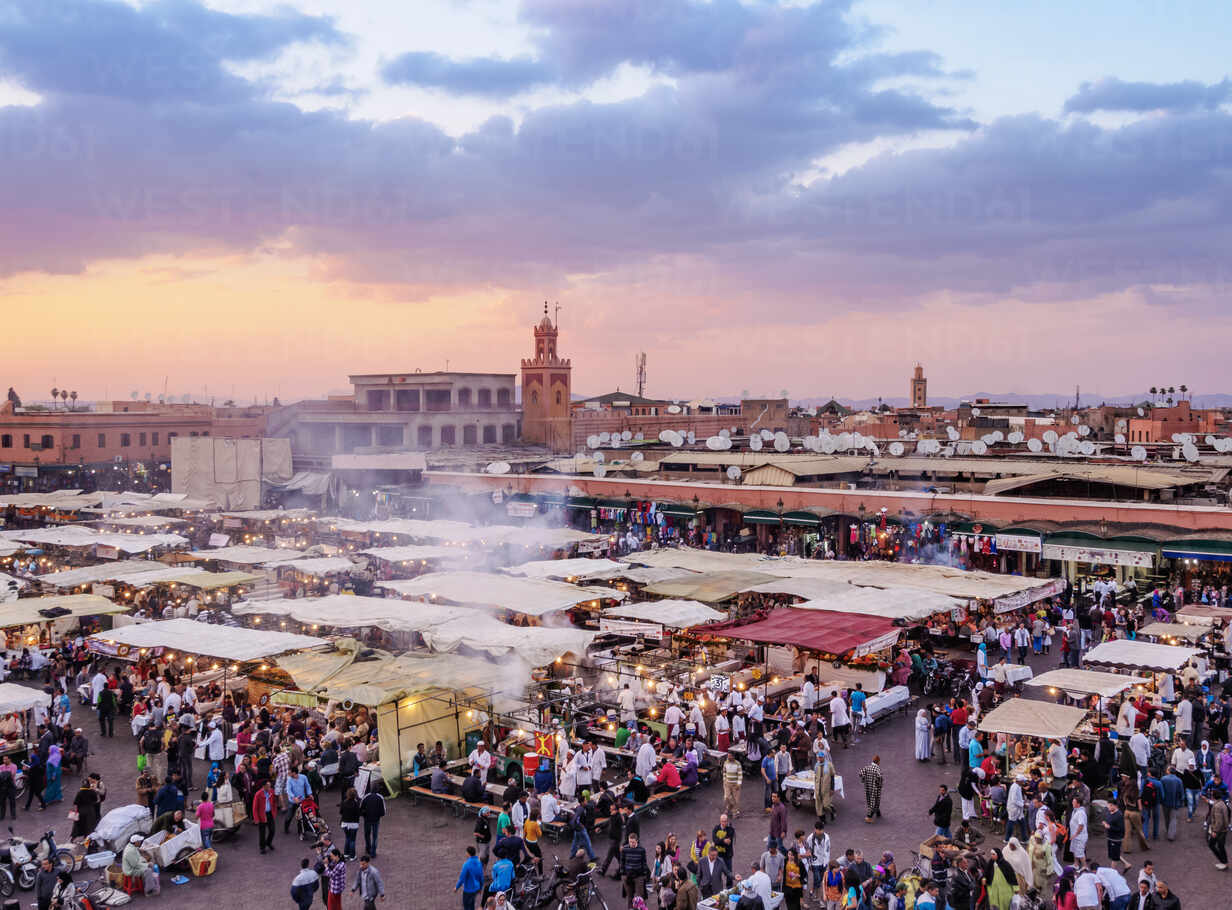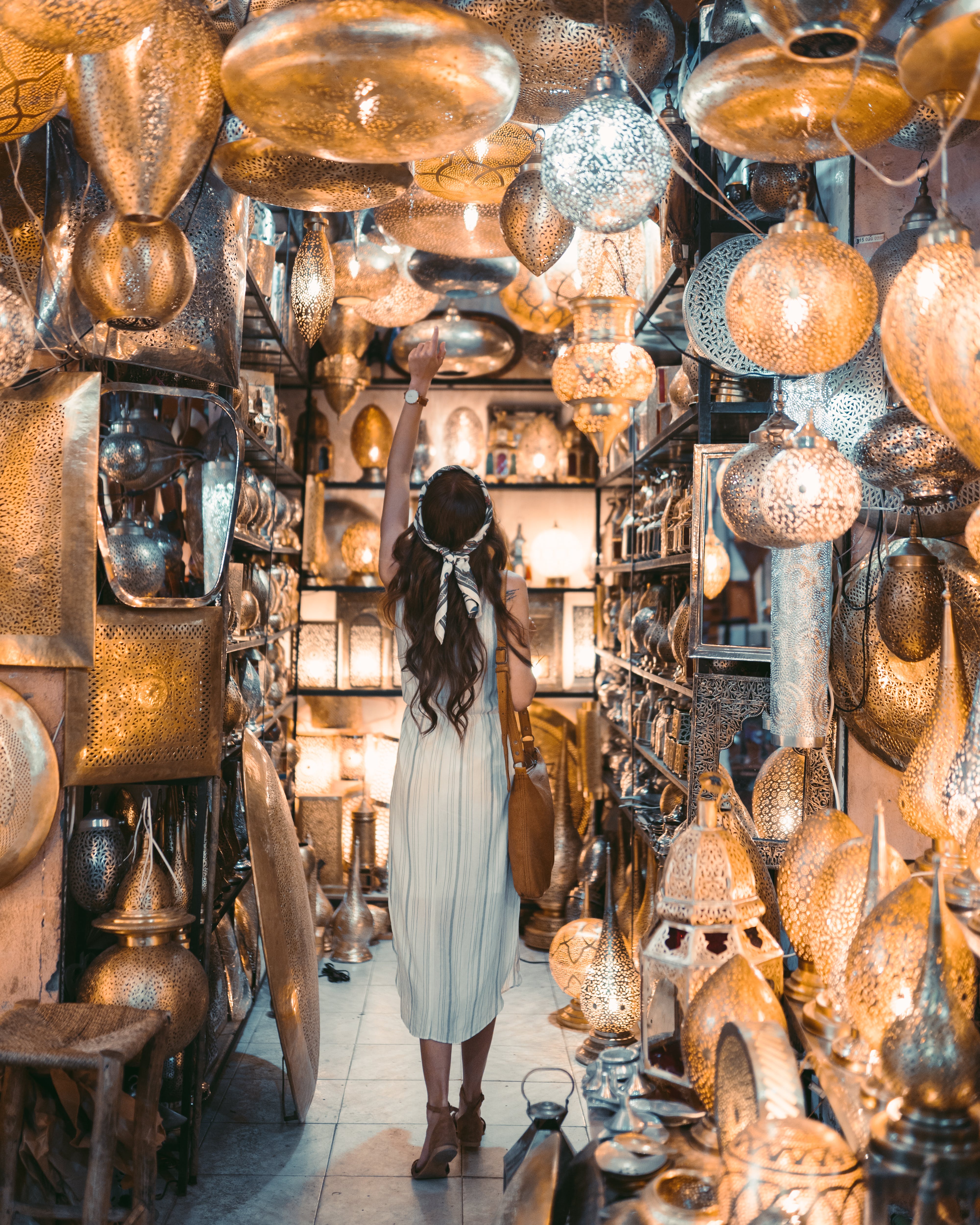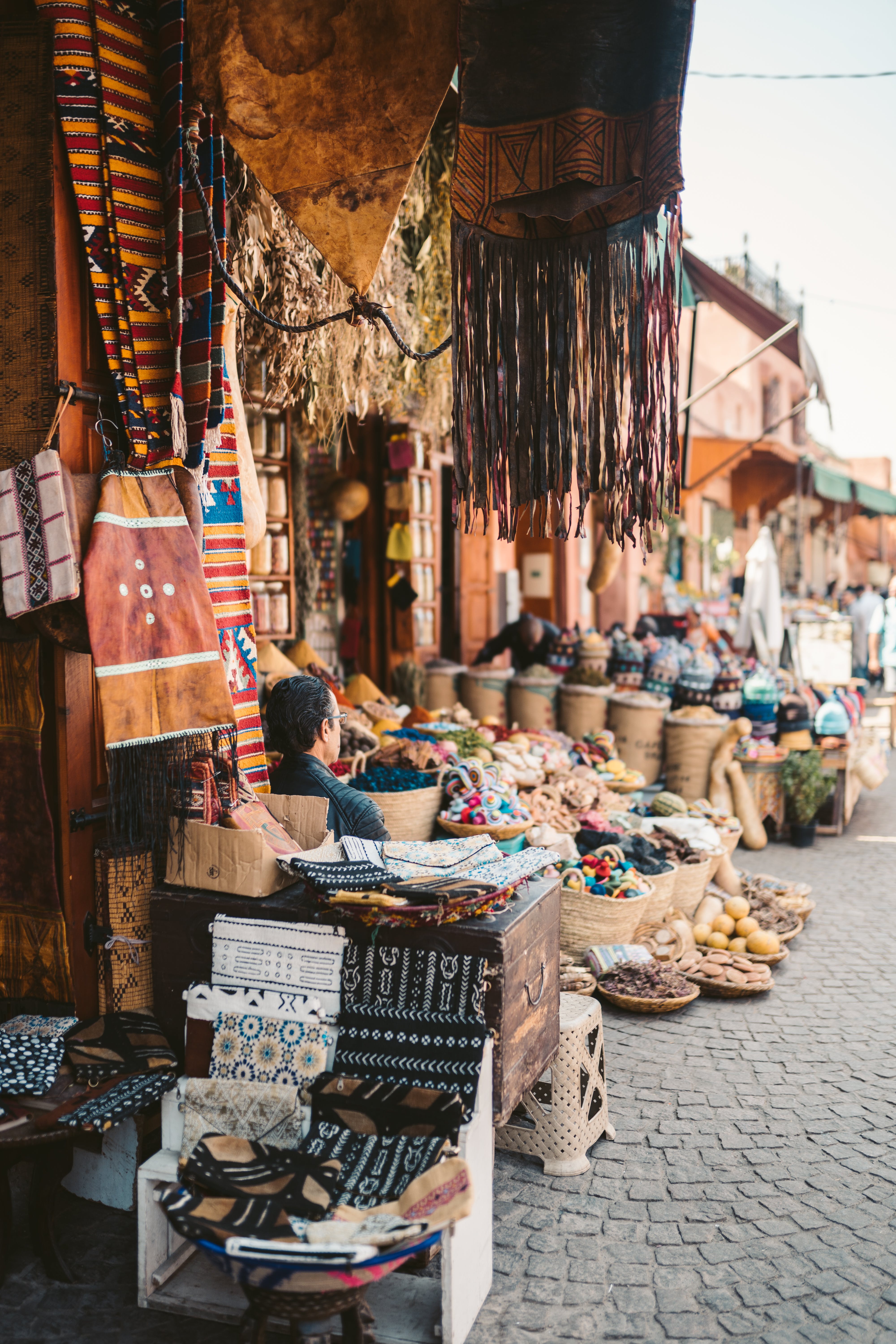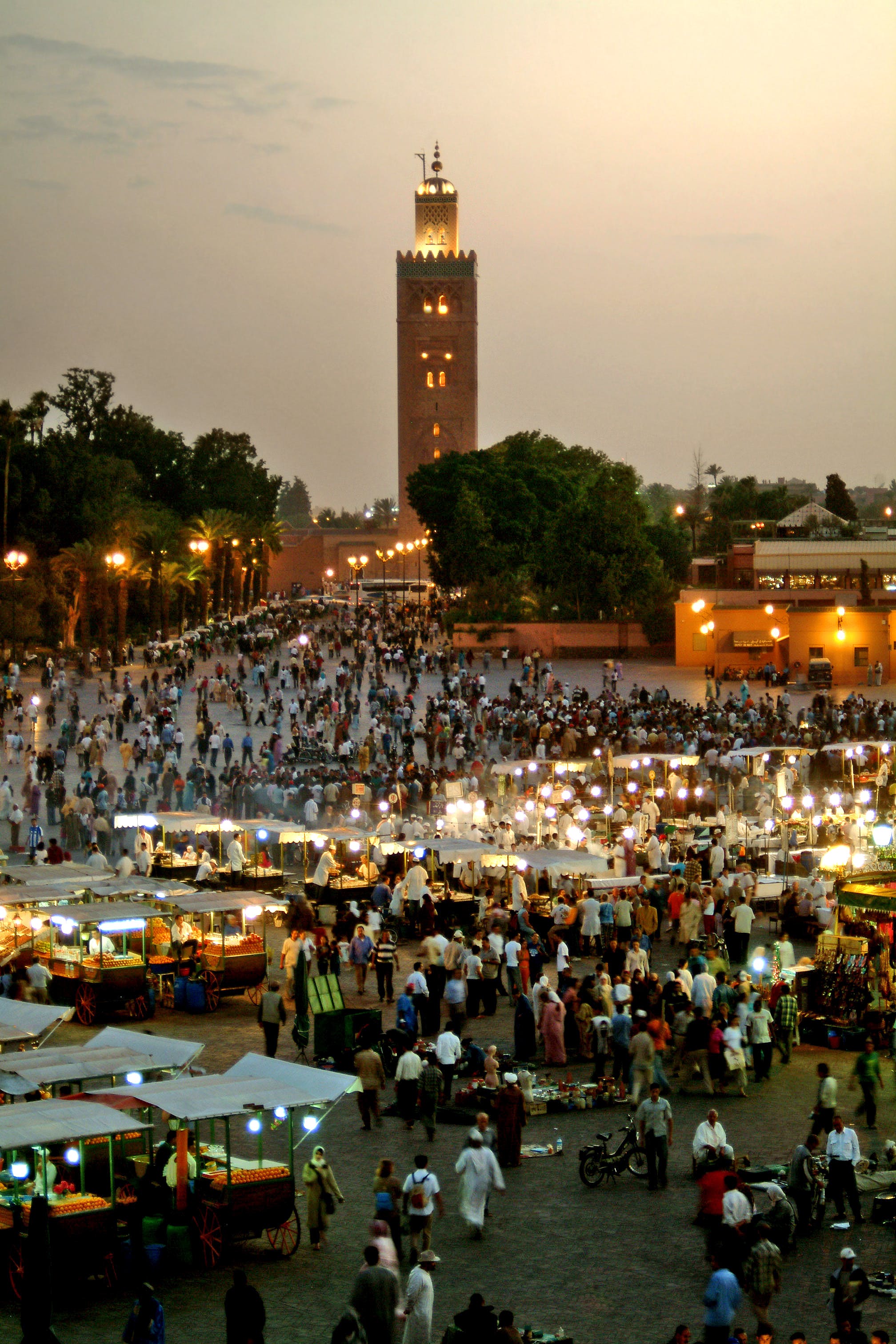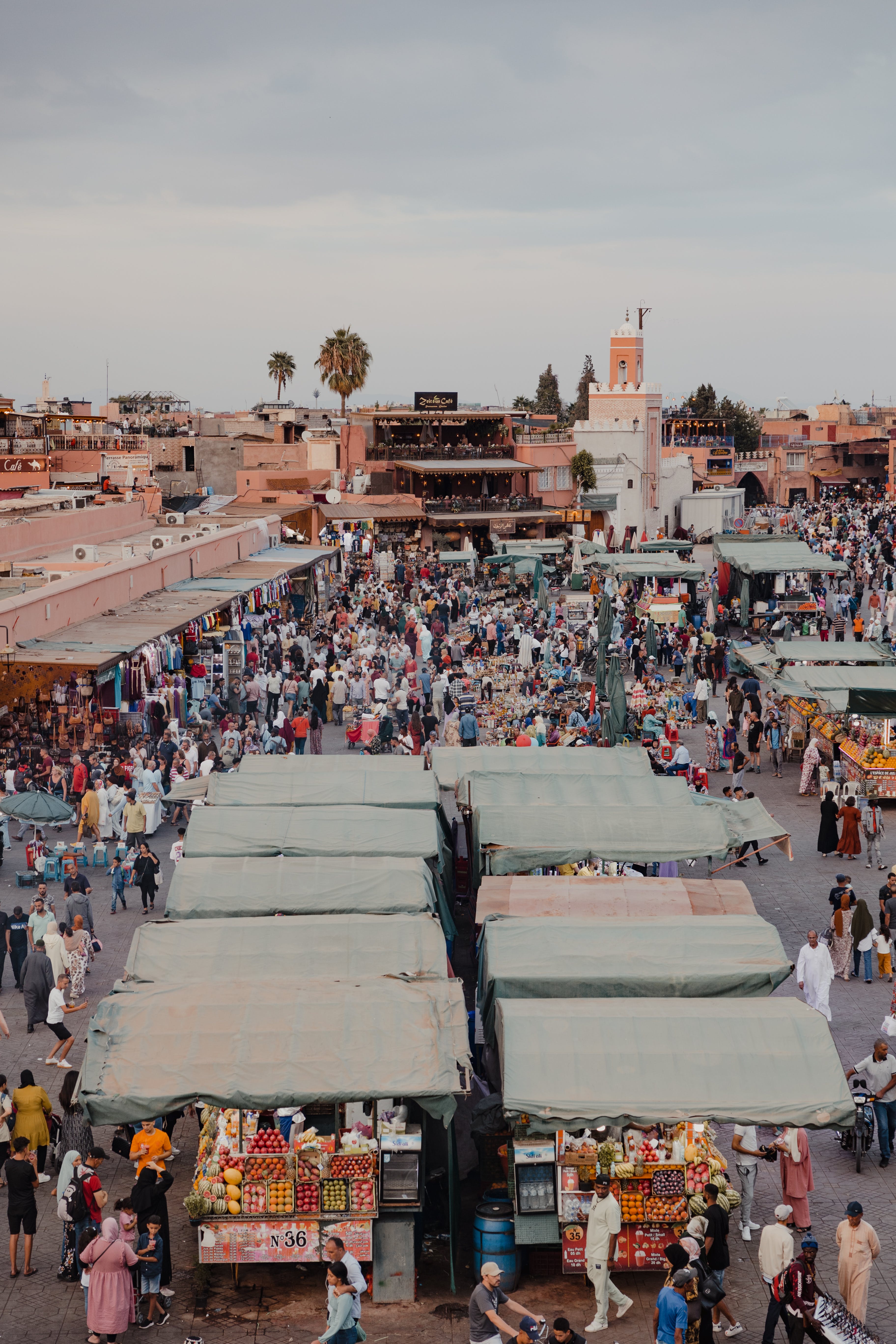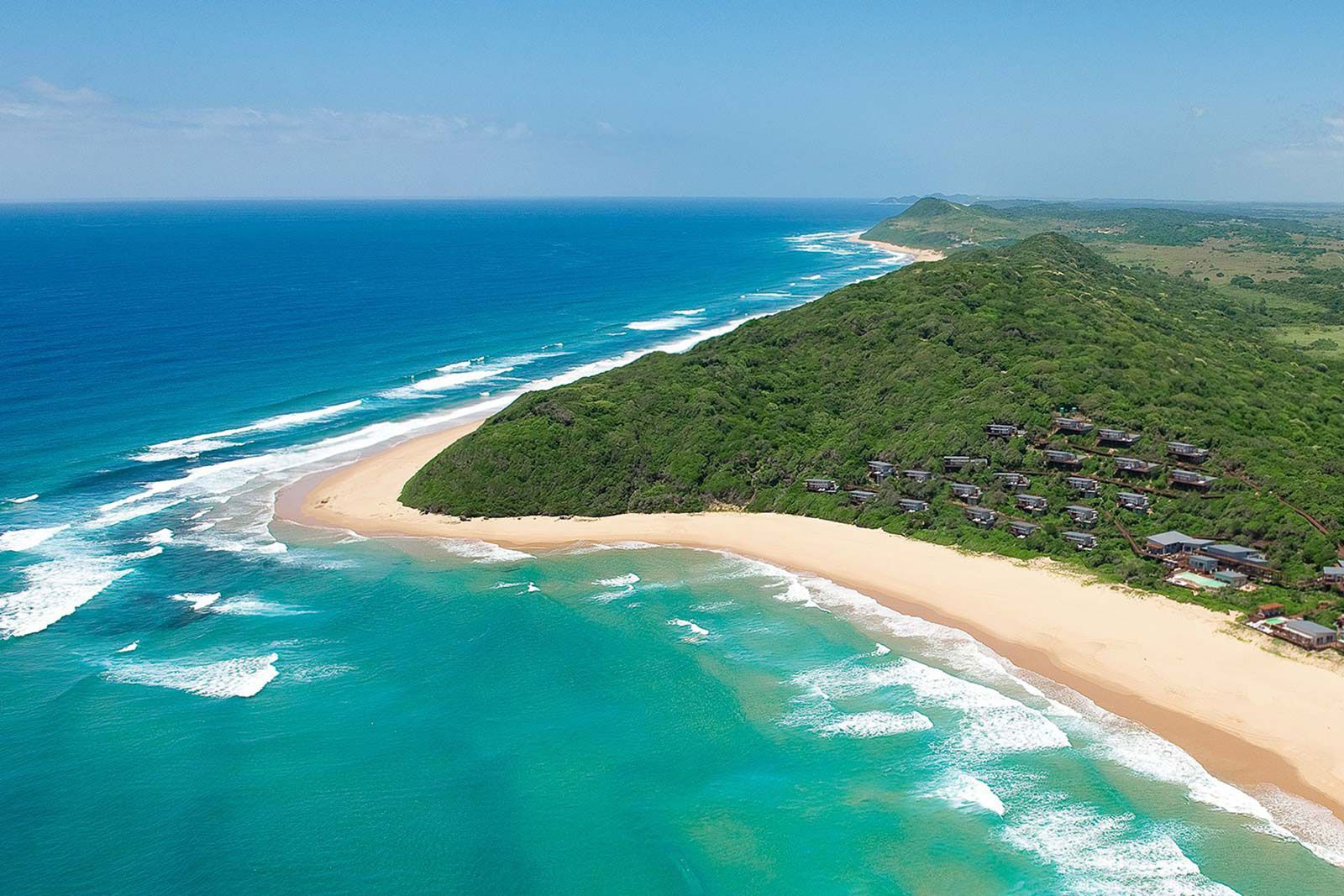Views Of Djemaa el Fna
About
Location:
Marrakech, Morocco
Djemma el Fna, also known as Jemaa el-Fnaa, is a famous and bustling square located in the heart of Marrakech, Morocco. The square is a vibrant hub of activity and is considered one of the main attractions in the city. Djemma el Fna is well-known for its lively atmosphere, filled with street performers, musicians, storytellers, dancers, and vendors selling a variety of goods.
During the day, the square is home to a bustling market where visitors can find a variety of items such as spices, textiles, and traditional handicrafts. In the evening, Djemma el Fna transforms into a lively entertainment venue with food stalls serving traditional Moroccan dishes, as well as musicians and performers entertaining the crowds.
One of the unique features of Djemma el Fna is the storytellers who captivate audiences with their tales of Moroccan folklore and history. The square is also a UNESCO World Heritage site and plays a significant role in the cultural life of Marrakech.
Overall, Djemma el Fna is a must-visit destination for those looking to experience the vibrant culture and atmosphere of Morocco.
Things to know before travelling to Djemaa El Fna
This article is a tip of the iceberg but will equip you with the "Absolute Need to Knows" for Djemma El Fna.
How to get there?
If you're coming to Djemma el Fna from outside of Morocco, the easiest way to get there is by plane. There are several international airports in Morocco, including Marrakech Menara Airport and Casablanca Mohammed V International Airport.
From there, you can take a taxi or a bus to Marrakech, and then walk or take a caleche to Djemma el Fna. It's also possible to travel to Morocco by train, but this can be a long journey. There are several border crossings between Morocco and its neighboring countries, so you can also travel to Djemma el Fna by car.
About the weather
The weather in Djemma el Fna is typically warm and sunny, with average temperatures ranging from the low 60s to the mid-80s Fahrenheit. The hottest months are July and August, while the coolest months are December and January.
However, the weather can vary depending on the time of year. In the spring and fall, the temperatures are mild, while the winter can bring rain and cooler temperatures. No matter what time of year you visit Djemma el Fna, you're sure to enjoy the warm Moroccan sun and the clear blue skies. Just be sure to pack sunscreen and a hat!
Medical matters that affect your visit to Djemma el Fna
To protect your health while visiting Djemma el Fna in Marrakech, you may want to take the following precautions and consider the following medical matters:
Vaccinations
Make sure you are up to date on routine vaccinations recommended by your home country, including measles-mumps-rubella (MMR) vaccine, diphtheria-tetanus-pertussis vaccine, varicella (chickenpox) vaccine, polio vaccine, and your annual flu shot.
Depending on your travel plans and medical history, you may also need vaccinations for diseases like hepatitis A, hepatitis B, typhoid, and rabies.
Traveler's Diarrhea
Djemma el Fna is a bustling public square with many street food vendors. To avoid getting sick from contaminated food or water, stick to bottled water, avoid ice cubes in drinks, and choose freshly prepared, hot foods.
Sun Protection
Marrakech is known for its sunny weather, so be sure to protect yourself from harmful UV rays by wearing sunscreen, sunglasses, and a hat, especially if you plan to spend a lot of time outdoors.
Heat-related Illness
The temperatures in Marrakech can soar, especially in the summer months. Stay hydrated by drinking plenty of water, and try to avoid spending extended periods of time outdoors during the hottest parts of the day.
Mosquito-borne Diseases
Marrakech is considered low risk for diseases like malaria and dengue fever, but it's still a good idea to protect yourself from mosquito bites by using insect repellent and wearing long sleeves and pants.
Travel Insurance
Consider purchasing travel insurance that covers medical emergencies, as well as any activities you plan to do while in Djemma el Fna.
Healthcare Facilities
Familiarize yourself with the location of the nearest healthcare facilities in case of an emergency. It's also a good idea to carry a basic first aid kit with essentials like bandages, pain relievers, and any prescription medications you may need.
By being prepared and taking the necessary precautions, you can help ensure a safe and healthy visit to Djemma el Fna.
Language and communication at Djemma el Fna
Most people in Djemma el Fna speak Arabic, but French is also widely spoken. Many people also speak English, especially those who work in the tourism industry. If you don't speak any of these languages, don't worry - there are many people who are willing to help you communicate.
And if all else fails, a friendly smile and a willingness to try can go a long way. Don't be afraid to use body language and hand gestures to communicate, as these are also common forms of communication in Morocco. And who knows - you might even pick up a few words of Arabic while you're there!
Safety at Djemma el Fna
Djemma el Fna is generally a safe place to visit, but it's important to take some precautions. It's best to avoid carrying large amounts of cash or wearing flashy jewelry, as this can make you a target for pickpockets.
It's also important to be aware of your surroundings and to avoid getting separated from your group. If you do encounter any problems, don't hesitate to ask for help from the local police or security guards. They are there to help keep the area safe and are usually happy to assist tourists.
Another safety tip for Djemma el Fna is to be aware of the food and drink vendors. Some vendors may offer free samples of food or drink, but it's best to avoid eating or drinking anything from unknown sources. These vendors may not follow proper hygiene standards, and their food may not be safe to eat.
It's also best to avoid raw fruits and vegetables, as they may have been washed in contaminated water. When it comes to food, it's best to stick to cooked items from reputable vendors. And don't forget to drink plenty of bottled water to stay hydrated!
With a little common sense, you can enjoy Djemma el Fna safely and have a great time exploring it's beauty.
Vital information on money matters
When it comes to money matters at Djemma el Fna, it's important to know that the local currency is the Moroccan dirham (MAD). The dirham is not available outside of Morocco, so it's a good idea to exchange your currency before you arrive.
The US dollar, the euro, and the British pound are all easily exchangeable for dirhams. Credit cards are not widely accepted in Djemma el Fna, so it's a good idea to have cash on hand. You should also be aware that vendors and merchants may try to charge more for goods and services if they know you're a tourist.
In addition to exchanging money, it's also important to be aware of the haggling culture at Djemma el Fna. Haggling, or bargaining, is a common practice in Morocco, and it's expected when purchasing goods at the market. The key to haggling is to start with a low offer and be prepared to walk away if the seller won't budge.
With a little patience and some friendly negotiation, you can get a great deal on souvenirs, food, and other items at Djemma el Fna. Just remember to be respectful and polite, and to have fun!
Fun things to do at djemma el fna
Djemma el Fna, located in Marrakech, Morocco, is a bustling square and market that offers a wide variety of fun activities for visitors to enjoy. Here are some of the fun things to do at Djemma el Fna:
Explore the Souks
The surrounding streets are filled with traditional Moroccan souks offering everything from spices and textiles to jewelry and leather goods. Exploring the souks can be a fun and exciting way to experience the local culture and shop for unique souvenirs.
Try Street Food
Djemma el Fna is famous for its street food stalls serving up delicious Moroccan dishes like tagine, couscous, grilled meats, and fresh fruit juices. Sampling the local street food is a must-do for food enthusiasts.
Watch the Performers
The square is a hub of entertainment, with performers like snake charmers, storytellers, musicians, and traditional dancers showcasing their talents. Watching these performances can be a fun and entertaining way to experience Moroccan culture.
Visit the Henna Artists
Henna artists can be found throughout Djemma el Fna, offering intricate henna designs for visitors to try. Getting a henna tattoo can be a fun and memorable experience.
Take a Carriage Ride
Horse-drawn carriage rides are a popular way to explore the city and get a different perspective of Djemma el Fna. It can be a fun and relaxing way to see the sights.
Visit the Koutoubia Mosque
Located near Djemma el Fna, the Koutoubia Mosque is an iconic landmark in Marrakech. Visitors can admire the stunning architecture and beautiful gardens surrounding the mosque.
Relax at a Café
There are several cafes and rooftop terraces surrounding Djemma el Fna where visitors can sit back, relax, and enjoy a cup of Moroccan mint tea while taking in the bustling atmosphere of the square.
Take a Cooking Class
Many cooking schools in Marrakech offer classes where visitors can learn to prepare traditional Moroccan dishes using local ingredients. Taking a cooking class can be a fun and interactive way to immerse yourself in Moroccan cuisine.
Overall, Djemma el Fna offers a vibrant and lively atmosphere with a wide range of activities to suit every interest, making it a must-visit destination for travelers looking to experience the rich culture of Morocco.
Who can travel to Djemma el Fna?
Djemma el Fna is a great destination for all types of travelers, but it's especially popular with backpackers, budget travelers, and those looking for an authentic cultural experience. Solo travelers will find plenty of opportunities to meet new people and make friends in the vibrant atmosphere of the square.
Families with children will also enjoy the sights and sounds of the square, as well as the many child-friendly activities available. And for couples, Djemma el Fna is a romantic and exciting place to explore together. No matter who you are, there's something for everyone at Djemma el Fna!
Travel Documents
You will need a valid passport and visa to enter Morocco. Make sure your passport is valid for at least six months after your travel date and check if you need to obtain a visa before traveling.
What time of the year is best to visit?
The best time to visit Djemma el Fna is generally between October and April. During this time, the weather is mild and pleasant, and the crowds are not as large as they are during the summer months.
The square is especially lively during Ramadan, the Islamic holy month of fasting, and during Eid al-Fitr, the festival that marks the end of Ramadan. These are great times to experience the local culture and see the square at its most vibrant. But no matter when you visit, you're sure to have an unforgettable experience!
Packing essentials for your trip
Packing essentials for a trip to Djemma el Fna in Marrakech, Morocco, may include the following:
- Lightweight, breathable clothing suitable for warm weather, such as cotton shirts and pants.
- Modest clothing that covers shoulders and knees, especially for visiting religious sites.
- Comfortable walking shoes or sandals for exploring the bustling streets and markets.
- Closed-toe shoes for walking in crowded and potentially dirty areas.
- Sun hat or cap to protect yourself from the sun.
- Sunglasses to shield your eyes from the bright sunlight.
- Scarf or shawl for covering your head or shoulders in conservative areas.
- Passport and travel documents.
- Local currency or credit cards for transactions.
- Travel insurance and emergency contact information.
- Sunscreen and insect repellent to protect against sunburn and insect bites.
- Basic first aid kit with medications for common ailments.
- Hand sanitizer or wet wipes for hygiene on the go.
- Camera or smartphone for capturing the lively atmosphere of Djemma el Fna.
- Adapter plugs for charging your electronic devices in Morocco.
- Printed or digital maps of Marrakech to navigate the city and find your way around.
- Guidebook or information on local attractions and cultural norm
- Lightweight daypack or crossbody bag for carrying essentials during your explorations.
- Larger suitcase or backpack for storing your belongings at your accommodation.
view map
Book Flight ticket
If this widget is not showing try reloading the page
The flight search result will be provided in a new tab
Marrakech Menara international airport will be a good destination if you are coming from outside Morocco
Book Hotel
If this widget is not showing try reloading the page
The hotel search result will be provided in a new tab
Input Marrakech as the city name to search and compare hotel prices
You can book tours with hotels upon arrival.
